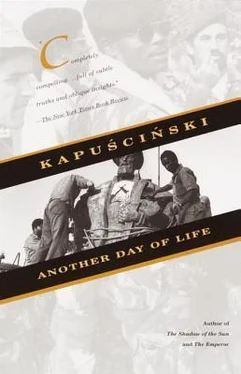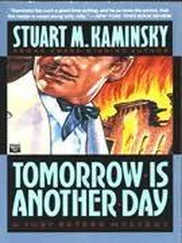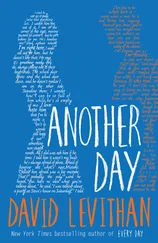I felt as if I couldn’t produce any sound, so I merely nodded that I understood what it meant to drive down the road we were on. Later I got hold of myself enough to ask why there were so few of us. If a company or even a platoon were with us there would be a better chance of getting through. Diogenes answered that there were few people on this front in general. They had to be brought from Luanda and Benguela. The land here was almost uninhabited. There were a few nomads — wild people who walked around naked. They had lost all their wars many years ago. Since then they had known they couldn’t win — their only hope was to hide in the bush. With a movement of his head, Diogenes indicated the wall of bush behind which these naked, defeated people were concealed. Next I asked why we were traveling in such a dilapidated truck. After all, the Portuguese had left so many splendid vehicles. Diogenes replied that the vehicles left by the Portuguese were the property of the Portuguese. There was no money to buy the trucks, and there wasn’t even anybody to talk to, since the owners were in Europe. But wouldn’t he agree, I pressed, that in a faster truck it would be easier to escape and harder to be hit, while by driving in a clunker like this we were rolling straight toward death? Yes, Diogenes agreed, but — he asked — what can we do? There was a gap in the conversation; the only sound was the roar of the motor and the whirr of the tires on the soft asphalt.
Time is passing, but we seem to be stuck in place. Constantly the same glimmering seam of asphalt laid on the loose red earth. Constantly the same faded, cracked wall of bush. The same blinding white sky. The same emptiness of a deserted world, an emptiness that betrays life neither by movement nor by voice. Our truck wobbles and rolls through this unmoving, dead landscape like a small tin car in the depths of a carnival shooting gallery. The owner turns the crank and the toy, stamped out of tin, bucks from side to side, and whoever wants to take a shot is welcome. In the back of the truck sit six soldiers hidden behind the ammunition boxes and sacks of flour. The sun is blazing mercilessly, so they pull the tarpaulin over themselves as if driving through a downpour. They are better off because, if we drive into an ambush, they can jump out of the truck and flee into the bush. The predicament of those in the cab is worse. Trapped in the metal box, they are like three moving targets tilting slowly forward and perfectly illuminated by the sun at the sixteenth parallel. The little tin car moves in the banal interior of the empty shooting gallery and the owner notes, with growing astonishment, that nobody wants to shoot at it. After all, it costs little to win an attractive prize. He turns the crank more and more drowsily and perfunctorily. The tin cutout moves slower, slower, until it comes to a halt.
We pull off to the side of the road. Ahead of us, on the same side, lies the wreck of a burned-out truck — the remains of a convoy that made it this far. Scattered cans, barrels, sacks, tires. In one place, scorched earth and charred bones. Whoever caught them must have killed them and then burned them, or even tied them up and burned them alive. It’s impossible to say who survived, or whether anyone survived at all. Diogenes says that if anyone escaped into the bush, they couldn’t have gone far; they would have died of thirst because there is no water here. They could survive only on the road, but on the road they could be killed. You have to keep to the road, but of course you can be ambushed. All right, there is no better way out, which means there is no perfect way out. That is what Diogenes says, and he observes that those who died in this burned-out truck must have made a mistake, they must have been traveling in the early morning or at dusk or at night. Then it’s cool and the enemy has the strength to come out onto the road and spring an ambush. At noon, on the other hand, the heat is going full blast and a deathly sleepiness and indolence seize the combatants. They retreat into the shade and drift into slumber. Martial enthusiasm sputters out and enmity grows tepid. You have to take advantage of this and travel at high noon, the safest time. I remember that Monti said the same thing. The front falls asleep when the sun stands at its zenith.
We drove until dusk under pressure, in an intent, helpless alertness, passing two more charred trucks from lost convoys. Diogenes urged the driver on, forbidding him to halt. At five in the afternoon we saw several armed people standing in the road. They stood there, pointing their automatic rifles toward us. Diogenes took his Kalashnikov off the safety and the soldiers in back got up from where they had been lying and, taking cover behind the cab, took aim at the people in the road. The driver slowed down and the distance between the truck and the people ahead decreased. Nobody fired. Then, when we were close — close enough to make out their figures and even their faces — one of the people in the road pointed his rifle upward and fired a round. Diogenes pulled his pistol out of his holster and also shot into the air. The Mercedes stopped and the people in the road came running up.
“Comandante Farrusco’s unit,” one of them said.
“Comandante Diogenes’s convoy,” Diogenes answered.
We were in Pereira d’Eça. They asked for cigarettes. I reached into my pocket and only then, when everything in me broke and subsided into loose, relaxed, calm particles, did I notice that my trousers and shirt were drenched in sweat, that I was wet all over, and that in my pocket, where there had been a pack of Polish Radomskie Extra-Strongs, I had nothing but a handful of damp hay smelling of nicotine.
The wrecked billboard on the way into town offers a chance to rest your eyes: “In Pereira d’Eça,” it says, “Stop at the Black Swan Inn. Air-Conditioning — Home Cooking — Garden— Bar — Attractive Prices.” And a clumsy drawing of a bird swimming in a lake that at this latitude could appear only in a dream. This is an inducement to those who have been around the world and grown acquainted with distant continents and unfamiliar territories. The traveler along the sterile and monotonous road from Luanda to Windhoek—2230 kilometers — can find a comfortable stopping place here. May I impart a word of advice to the weary wayfarer? Don’t stop in this town tonight. Not these days. Times have changed and the promised comfort is lacking. There may be water, indeed, but there are no lights. It’s dark. The moon doesn’t rise. There are only stars, but somehow distant ones, faint and not very helpful. It’s not a good place to sleep, because the houses have been smashed and looted. Nor is the cuisine to be recommended. On the concrete floor of the inn, in a puddle of dried blood, lies a butchered goat that has already begun to reek. Anyone who’s hungry carves out a hunk of meat with a bayonet and roasts it over the bonfire. How do these people live? Why don’t they die of poisoning from carrion virus? Nor can one count on the advertised air-conditioning. It is sweltering and not even at night does the heat lift from the earth; it crushes the languidly, viscously unmoving, flattened town.
In the glare of an oil lamp, the only light, three faces are visible, covered with sweat, shining as if smeared with olive oil. The wide, bearded face of Comandante Farrusco. The pale face, covered with adolescent pimples, of his assistant Carlos, the hero of Luso. The prematurely destroyed, uncared-for face of a woman named Esperança. We are sitting in the inn on crates and stools, but the leader has settled in an armchair. Outside the window soldiers drift around the plaza, dissolving into the gloom, black, like darkness set in motion. “Why aren’t they going to their posts?” Farrusco asks, but he falls silent and gives no orders. The rest remain quiet; it was evidently a meaningless question, although the answer is known. It is obvious that going to their posts wouldn’t improve anything, wouldn’t help. This is a unit sentenced to annihilation; there is no saving it.
Читать дальше











